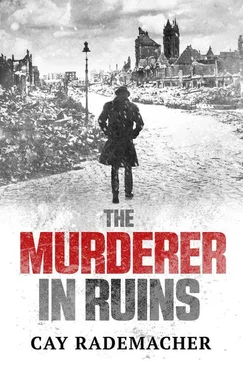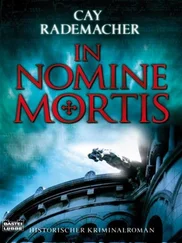Cay Rademacher - The Murderer in Ruins
Здесь есть возможность читать онлайн «Cay Rademacher - The Murderer in Ruins» весь текст электронной книги совершенно бесплатно (целиком полную версию без сокращений). В некоторых случаях можно слушать аудио, скачать через торрент в формате fb2 и присутствует краткое содержание. Год выпуска: 2015, ISBN: 2015, Издательство: Arcadia Books Limited, Жанр: Триллер, на английском языке. Описание произведения, (предисловие) а так же отзывы посетителей доступны на портале библиотеки ЛибКат.
- Название:The Murderer in Ruins
- Автор:
- Издательство:Arcadia Books Limited
- Жанр:
- Год:2015
- ISBN:9781910050750
- Рейтинг книги:5 / 5. Голосов: 1
-
Избранное:Добавить в избранное
- Отзывы:
-
Ваша оценка:
- 100
- 1
- 2
- 3
- 4
- 5
The Murderer in Ruins: краткое содержание, описание и аннотация
Предлагаем к чтению аннотацию, описание, краткое содержание или предисловие (зависит от того, что написал сам автор книги «The Murderer in Ruins»). Если вы не нашли необходимую информацию о книге — напишите в комментариях, мы постараемся отыскать её.
The Murderer in Ruins — читать онлайн бесплатно полную книгу (весь текст) целиком
Ниже представлен текст книги, разбитый по страницам. Система сохранения места последней прочитанной страницы, позволяет с удобством читать онлайн бесплатно книгу «The Murderer in Ruins», без необходимости каждый раз заново искать на чём Вы остановились. Поставьте закладку, и сможете в любой момент перейти на страницу, на которой закончили чтение.
Интервал:
Закладка:
There were others who were haunted every night by events they had actually experienced: the fear of death on the front line, in a submarine, cowering in a cellar, sitting in a Gestapo cell. There were ways of dealing with that, Stave reckoned – maybe now that the war was over, maybe revisiting the scene of the horror. But how could anyone break free of a nightmare based on something they had never witnessed?
Self-pity was no help either, he reflected, clambering out of bed. The sheets crackled as the frost on them broke. I need to get more fuel, he said to himself as he kindled fire in the wood burner.
A short while later he set out on the long walk to CID headquarters; there was no fuel for the buses. A few tram lines had been patched up and were working again, but only for a few hours each day. I could get used to having Ruge’s taxi service, Stave thought to himself.
But secretly he was grateful for the hour’s walk. He was used to the sight of the rubble, the yellowing posters, the chalk graffiti, the cowed figures on the streets; none of that got him down any more. He enjoyed keeping up a brisk pace. It warmed him up, while at the same time the icy wind kept his head clear. Nothing to worry about, nothing to trouble him – for a whole hour.
By the time he reached the tall building on Karl-Muck-Strasse he was in a good mood. Erna Berg was already waiting for him, a smile on her face, maybe even a little more cheerful than normal.
‘The Herr Lieutenant is waiting for you in your office.’
Maschke was there too, but his secretary had either forgotten that or deliberately not mentioned him. The chief inspector said hello to both of them and sat down, preferring to keep his overcoat on. Erna Berg hurried over, set two mimeographed sheets down in front of him, gave MacDonald a shy glance and disappeared.
‘Doctor Czrisini’s report,’ Stave said. The other two were silent for a moment while he studied it. ‘A few things at least are clear. The date of death was between the eighteenth and twentieth of January, most probably towards the latter. So we may as well take the twentieth as a starting point. Cause of death: strangulation. It seems likely the murderer used a piece of wire. And highly likely he approached his victim from behind and slung the wire around her neck. It doesn’t look as if she tried to defend herself. Apart from that no other marks or evidence either on or inside the body.’
‘No sign of sexual intercourse?’ Maschke asked.
Stave shook his head. ‘No indication of rape. Nor any traces of sperm or other suggestions of consensual sexual activity shortly before death. Although obviously that possibility cannot be totally excluded.’
MacDonald coughed, clearly embarrassed. ‘How do you mean?’
Maschke gave a wan smile. ‘In the case of consensual sexual intercourse there would be no obvious wounds. Down there, I mean. And if the lucky lad she’d last let do the business was wearing a French letter, there’d be no trace of sperm either.’
‘That’s one way of putting it,’ Stave muttered. ‘But it is also clear that she’d been lying there for two days at most, meaning the killer hasn’t had that much time to vanish into the woodwork.’
The lieutenant smiled: ‘Given that no ships and only a few trains have left the city, that means he must still be in Hamburg.’
‘Not exactly reassuring for the good folk of our city,’ Maschke added.
‘But it makes our work a bit easier, I hope,’ Stave said, before turning to MacDonald: ‘Have you asked around amongst your fellow officers?’
‘They all took a look when I showed the photo of the strangled woman around at the club,’ the lieutenant replied. ‘But nobody recognised her. The officers have promised to ask their men, but I fear we won’t get much of a response there.’
Maschke snorted dismissively, but said nothing, catching Stave’s warning glance.
‘Keep at it,’ the chief inspector muttered. ‘It’s like surgeons and appendectomies; you can’t be 100 per cent sure of anything until you’ve eliminated all possible alternatives.’
The lieutenant nodded, and smiled again: ‘My pleasure.’
For him this investigation is just a bit of sport, like fox-hunting, Stave thought to himself, but then maybe that’s not such a bad comparison. He sighed wearily, ‘I need to go and file a report to the public prosecutor. Lieutenant, will you please be so good as to ask around a bit more amongst your comrades-in-arms? At the moment, British soldiers are the only ones who can easily leave Hamburg. And time is pressing.’
MacDonald nodded.
‘And Maschke, perhaps you can make enquiries amongst the street crime department. It might have been a mugging, somebody taking the girl for everything she had on her. These days even underwear fetches a price on the black market. See if they have anything on their files.’
Maschke cleared his throat, embarrassed all of a sudden. ‘You know, Chief Inspector, the files aren’t…’
Stave cursed under his breath. On 20 April 1945, with the British at the gates of the city, the Gestapo had burned all their files, some of them in the crematorium of the Neuengamme concentration camp. In doing so they had not only destroyed the evidence of their own crimes but also documentation relating to large numbers of ordinary criminals. If, prior to 1945, there had been reports of a mugger who was happy to murder using a piece of wire like a garrotte and taking every item from his victim including their underwear, then like as not there would no longer be a file on him.
‘Give it a go, even so,’ he said.
Maschke got to his feet and left, nodding to Stave but ignoring the lieutenant.
MacDonald however had got to his feet too, and casually asked Stave, ‘Which public prosecutor is responsible for this case?’
‘Doctor Ehrlich,’ Stave replied. ‘I’ve not dealt with him before.’
‘I know him – from England.’ The lieutenant gave him a look that was part sympathetic, part amused. ‘You should take care. He’s a tougher nut than he looks and he might not be the greatest fan of the Hamburg police.’
Stave slumped back down on his seat and suggested MacDonald sit down again too: ‘I would be grateful if you could fill me in.’
MacDonald smiled: ‘Just between the two of us?’
‘But of course.’
‘Herr Ehrlich,’ the lieutenant said in a measured tone, ‘joined the Hamburg public prosecutor’s office in 1929. He’s a very cultivated man, well-educated and gifted in music, a collector of modern art, above all the Expressionist movement. And, unfortunately, Jewish.’
The chief inspector closed his eyes. He knew what was coming.
‘In 1933, of course, he was immediately dismissed,’ MacDonald continued in the same dispassionate tone. ‘He got a job as a copy editor for a legal publishing house thanks to his wife – who by the way was Aryan enough to be a Wagnerian opera star. Both their sons were sent to private school in England, to get them out of the line of fire. Then came Reichskristallnacht.’
Stave nodded. He remembered the night. When the first reports of arson came in he was in the police station at Wandsbek, about to rush out to the nearest synagogue. Then came the order to remain in the building. A very clear order. And he complied. Not exactly the most heroic moment in his life. He had never spoken of it to anyone, not even Margarethe.
‘Ehrlich was arrested on the night of 1 November 1938 and taken to Neuengamme. I can imagine it wasn’t much fun, even though he almost never mentions it. A few weeks later he was released; friends in London had got a British visa for him. He sold off his art collection – for a song, I imagine. He managed to scrape together just enough money to buy his passage to England. His wife was not allowed to go with him; the visa was for him alone. Then war broke out.’
Читать дальшеИнтервал:
Закладка:
Похожие книги на «The Murderer in Ruins»
Представляем Вашему вниманию похожие книги на «The Murderer in Ruins» списком для выбора. Мы отобрали схожую по названию и смыслу литературу в надежде предоставить читателям больше вариантов отыскать новые, интересные, ещё непрочитанные произведения.
Обсуждение, отзывы о книге «The Murderer in Ruins» и просто собственные мнения читателей. Оставьте ваши комментарии, напишите, что Вы думаете о произведении, его смысле или главных героях. Укажите что конкретно понравилось, а что нет, и почему Вы так считаете.











